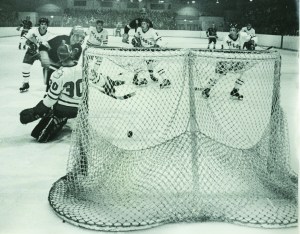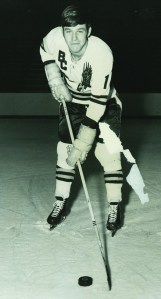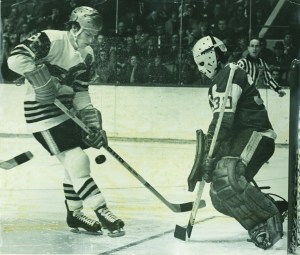Vincent Shanley, Boston College ’72, succumbed to pancreatic cancer on the weekend of Thanksgiving 2018. This blog post is for him.
I traveled with the Boston College hockey team to all games in the 1971-72 season, when Vin was team captain and Snooks Kelley was in his 36th and final year of coaching BC. He was an ideal captain – not the most talented player on the team but the one to whom everybody looked up. I always thought that he was a breed apart from his teammates, even though he was still one of the boys too.
As a BC senior, he was already married to his lovely wife Christine. He was thoughtful and serious – I recall one time, on a bus trip to a game at Dartmouth, everybody else was horsing around, playing cards and telling jokes. Vinnie had his nose buried in “The Vantage Point,” a telephone-book-sized memoir by Lyndon Johnson. I could tell right then that Vinnie was going places and that he’d already scoped out the trajectory of his eminently successful legal career.
My article that follows was published at the time of Vin’s induction to the BC Hall of Fame in 2016.
May he rest in peace!
Vin Shanley ‘72
Ice Hockey
Vin Shanley looked around the crowded locker room and thought, “Oh my God, What am I doing here?”
It was 1963. All the other candidates for the Boston Technical High freshman team wore uniforms emblazoned with logos from their youth hockey programs.
Not Vinnie. He’d never played organized hockey. He felt lost in the puck handling drills. But then came the skating contests. And Vin Shanley could fly. Ever since he can remember, he’d walked the mile from his home in Brighton to the Boston Skating Club. Three days a week. Just to go skating.
Shanley outstripped them all and made the team. The hockey know-how, taught by coach Vic Campbell, came quickly. He showed Shanley the fine points, like how to snap off a wicked backhand shot, and how to cradle the stick blade as he would a catcher’s mitt when receiving passes.
In his junior and senior years, Shanley was the leading scorer in the Boston City League. But Boston College coach John “Snooks” Kelley wasn’t initially interested. Vin put in a post-graduate year at New Prep, a frequent opponent for the Eagle freshmen.
The first time the team came to BC, Vin scored two goals. A week later, the planned opponent cancelled out, and New Prep coach Owen Hughes agreed to play at McHugh Forum again. This time Vinnie scored a hat trick, with two of the goals coming on 20-foot backhanders.
The next day, the Shanleys’ phone rang. It was Snooks. He had already given out all of his scholarship money, he explained, but he asked Vinnie to come to BC as a recruited walk-on. Vin survived the cuts in freshman year and played as a regular. The next year he made it through the grueling two weeks of tryouts and beat out a couple of scholarship players for a varsity berth.
Kelley called Shanley into his office. “I like your work ethic, kid. You’re on the team,” the Snooker said.
“I never missed a game, never missed a shift, in three years. I’m proud of that,” said Vin. “But I was never so proud as I was when I skated onto that ice wearing the Maroon and Gold. I was a Boston College hockey player.”
Vin’s sophomore year started off well but ended in disaster. Stacked with talented seniors, the team cruised through the first half of the schedule near the top of the standings. But then, beset by senioritis, they lost eight of their last 11 games and spiraled out of sight.
For the rest of Shanley’s BC career, the team was rebuilding and struggling for mere respectability. Before his junior season, Vin addressed his teammates.
“We saw what happened last year,” he said. “We’ve lost eight players from that team including three All-Americans. But we’re going to play hard, we’re going to do the best we can, and we’re not going to tolerate any nonsense.”
The team got the message but didn’t have the talent. They went 11-15 and missed the playoffs for the first time. Coach Kelley announced that he’d be retiring after the following season. His career-win mark stood at 487.
Shanley and his mates dedicated their season to winning 13 games to send Snooks off with 500 wins. It’s a mark that seems quaint now, but was a towering achievement 44 years ago.
Talent on the 1971-72 team was a bit better. Juniors Bob Reardon and Ed Kenty had emerged to be fine forwards. Shanley, Scott Godfrey, and Jack Cronin were the senior spiritual leaders. They all felt that they were good enough to get the Snooker his 500th, and maybe even to make the playoffs. They elected Shanley their captain.
Kenty, a Hall of Fame inductee in 2002, stated,
“Vinnie wasn’t the most naturally gifted player but was an extremely hard worker who led by example. He was not afraid to speak up when players slacked off — and believe me, I know that first hand. He also was a selfless player who made others around him better. I centered Vinnie and Scott Godfrey. I think that in my three years, it was the best line I played on.

Shanley scoring against the St. Louis University Billikens in 1972. His centerman Ed Kenty is in background.
“As a person, Vinnie was always pulling the guys together off the ice as most good captains do, and he connected with everyone on every level. In summary, great leader, very good player and a super guy.”
The 500th victory for Snooks didn’t come readily. By late February, the Eagles had ten wins, but the remaining schedule included a North Country swing to Clarkson and St. Lawrence and a meeting with national champion BU, who had thrashed the Eagles seven straight times.
But they pulled it off. And, miracle of miracles, they did it against the Terriers, 7-5. Kenty scored four times, including an empty-netter to clinch the game. In the frantic waning seconds, the puck had caromed out to Shanley. His eyes lit up. But the disc eluded his stick and landed on Kenty’s.
BC did not make the playoffs, but they attained the goal that truly counted. At the post-season banquet, Shanley received, for the second consecutive year, the Pike’s Peak Club Award as the Player Who Best Typifies Boston College Hockey.
Vin has stayed involved with the Pike’s Peak Club. He has been on the Board of Directors for 40 years and served three terms as president. The Club initiated its endowed scholarship during his presidency. He and his wife Christine have three children: Meagan, 43; Vincent, 41; and MaryKate, 38, as well as four grandchildren.
Vin played an important part in bringing Jerry York back to The Heights. As a member of the committee to select the Eagles’ third coach in three years, he made a passionate argument for the experience, steady hand, and previous track record of Coach York. It carried the day.
The rest is a history of success. But that success may never have occurred without Vin Shanley, the walk-on from Brighton who became one of Boston College hockey’s most respected captains and leaders of all time.


